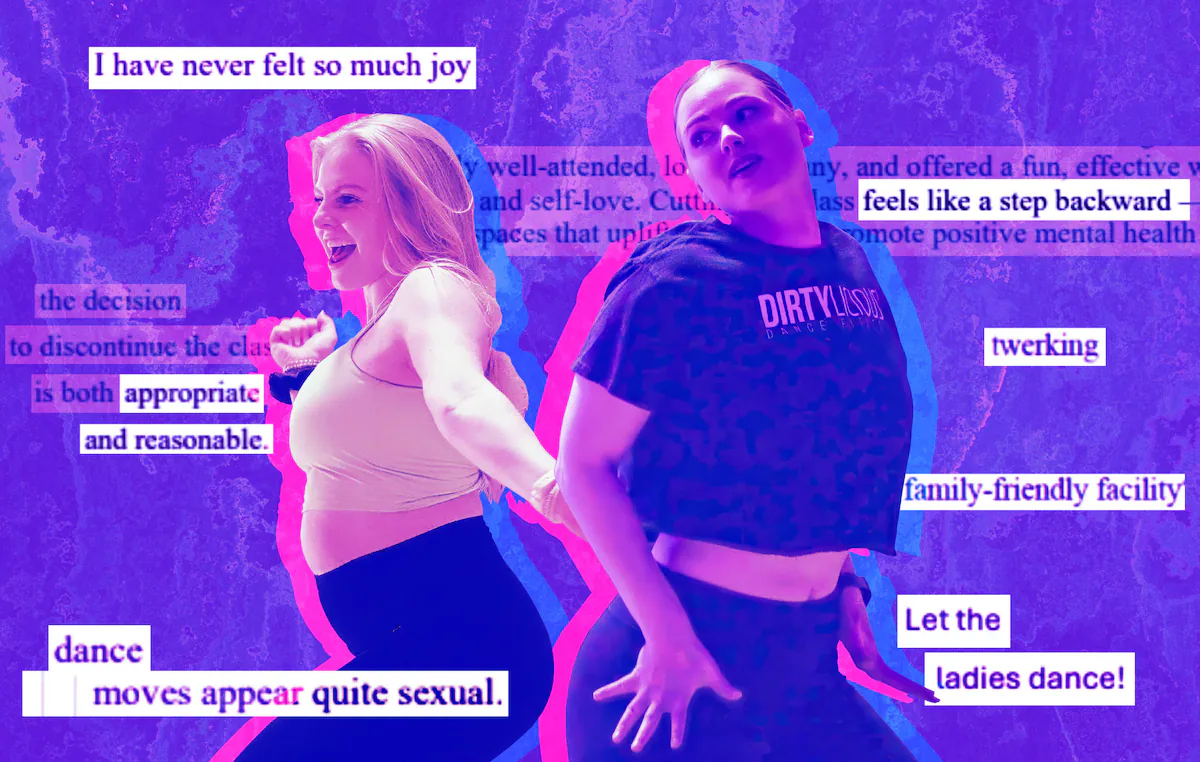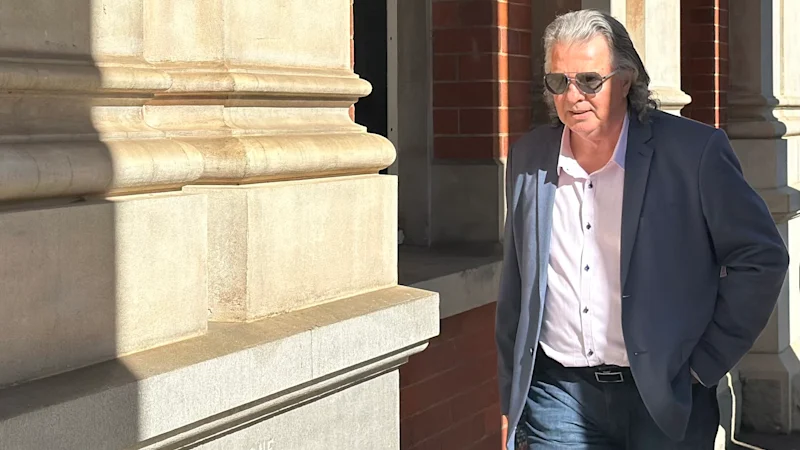Copyright Salt Lake Tribune

Provo • About 40 years after Kevin Bacon famously filmed “Footloose” in Payson, Utah, joyful dancing split another community just 20 miles north. In Provo, just like in the 1984 movie, a group of people found self-empowerment and expression (and a fun workout) through dance, but the city shut them down. Unlike in the film, these defiant, mostly female dancers haven’t found redemption. Erica Tanner and her husband, Matson, are still reeling after the Provo Recreation Center abruptly dropped their Dirtylicious Dance Fitness classes. They were told this summer that the sometimes sexier dance moves didn’t adhere to the rec center’s standards and mission — an eviction that documents obtained by The Salt Lake Tribune now shine a clearer light on. Dirtylicious includes sensual moves like twerking, body rolls, shimmying and slinky moves against the floor, a former class instructor and dancer concede — but they argue it’s not so different from the Zumba or U-Jam sessions still being offered at the center. In a town that’s home to the private campus of Brigham Young University, sponsored by The Church of Jesus Christ of Latter-day Saints, and in a state with a culture of perfectionism and morality policing that’s grabbed the national spotlight in shows like “The Secret Lives of Mormon Wives” and “The Real Housewives of Salt Lake City,” the Tanners wonder if their classes were targeted for pushing boundaries — and for daring to include the word “dirty.” Dance is a “judgment-free zone,” said Erica Tanner, co-founder of Dirtylicious. “We’re so diverse, and that’s what’s so beautiful about dance — it brings people together.” As a Latter-day Saint, Erica Tanner said the classes have helped her and other dancers feel empowered despite what she considers the faith’s “purity culture.” “Loving yourself and dancing and touching your body and twerking a little bit doesn’t make you impure,” Matson Tanner said. “... We need to loosen up. We need to be more free, and we also need to be more accepting of all the other people around us.” The cancellation was just the beginning of the controversy. Provo city employees lost their jobs. At one point, the American Civil Liberties Union of Utah considered getting involved. Now, the Tanners are wondering if they should change Dirtylicious to fit into its hometown — or accept the rejection. It all started, according to a city statement, when one complaint triggered a “thorough review” of the program that identified “various issues,” including unauthorized filming inside the city-owned space. Officials added that separate concerns were also “raised about the appropriateness of class content for the facility’s family-friendly environment.” “The Provo City Recreation Center is a taxpayer-funded facility with a clear mission to support family-friendly programming, reflected in the operating policy that all programming is open to, and needs to be appropriate for participants aged 14 and older,” the city said. “Our review identified elements of the program that raised concerns about alignment with this mission.” The Tanners said it appears the city’s decision was based on a misunderstanding that officials didn’t seem interested in letting them rectify. The controversy has left them questioning everything — their business model, their beliefs and values, their friends, even themselves. “It’s changed the whole way I look at the government, how I vote, who I’m trusting,” Erica Tanner said, “like, what am I doing? I’ve changed so much. I’ve learned so much. I’m grateful for that.” The complaint that started it all The complaint that seems to have led to the downfall of Dirtylicious at the rec center was emailed May 24 to the Provo City Council and Utah County state Reps. Norm Thurston and Lisa Shepherd. It was obtained by The Tribune via an open records request, along with the center’s responses. The emailer identified themself as both a parent and taxpayer who was concerned about a video they’d seen on Facebook from a city employee advertising the class. “I noticed that many of the dance moves appear quite sexual,” they wrote. “Since the Recreation Center is a family-oriented facility supported by our local government (paid for with citizen bonds and/or property taxes) and accessible to teens and younger children, I believe this type of content is inappropriate.” Thurston responded, saying he looked at the Dirtylicious website and supported the emailer’s concerns. He told The Tribune that he didn’t think the programming was “family friendly” but wasn’t involved in Provo’s decision-making, aside from his communication in that email thread. On May 27, Provo’s then-rec center manager, Cathy Smits, thanked the person for their concern and explained that Dirtylicious, sometimes abbreviated as DDF, was available in other Utah rec centers. “Our DDF classes emphasize fitness, confidence-building, and body positivity in an inclusive community environment,” Smits wrote. “All instructors are trained professionals who ensure classes remain appropriate for our public recreation setting while adhering to DDF’s core values of strength, personal growth, optimism, and community connection.” “We understand that dance fitness classes may be perceived differently by community members,” she continued. “Our instructors maintain professional standards appropriate for a municipal recreation facility, and we regularly evaluate all programming to ensure it aligns with our mission of serving the diverse needs of Provo residents.” On May 29, the person responded. “It sounds like you’re not recognizing how sexual this dance class is,” they said. “And I’m not comforted by the idea that other cities are doing it.” By June 4, Smits had reversed her position. She told the emailer that the complaint had “given me an opportunity to more deeply consider this class and current facility operations.” She said the review found that some instruction “has not aligned with our facility standards and my expectation.” She said the city is “addressing this matter promptly.” That day, Dirtylicious classes were suspended. By June 23, the city decided to remove the classes permanently. The Tribune sent a request for comment to the email address of the person who had complained but received no response. Efforts to contact them separately were also unsuccessful. Thurston said he did not know the person. The city was also unable to find record of a rec center membership for anyone with the name the emailer provided. After news of the class cancellation, the person who first complained sent Smits another email. They wrote, “It was interesting to see people were upset, but what stood out to me was that none of them really denied that the class was sexualized. That seems like a pretty key point.” Smits now works as the city’s aquatics supervisor, and a former fitness coordinator who advocated for Dirtylicious’ programming resigned July 22, the city said. The city did not respond to The Tribune’s questions about whether they were disciplined amid the controversy. Dirtylicious Dance Fitness instructors also lost their positions. The city never had any contractual relationship with Dirtylicious, but it did pay instructors, like Nathalie Atanazio, who were certified to teach it. What Provo knew The city had received only the single, May 24 complaint when Dirtylicious was kicked out of the rec center, records obtained by The Tribune indicate. The city received five additional complaints in July, after the decision was made. The city shared a total of nearly 70 exchanges with staff; more than 30 messages supported the classes. But city officials also told The Tribune that their review had uncovered previous complaints about the program’s “appropriateness” — messages that were “apparently suppressed rather than being brought to management’s attention.” The Tribune also obtained those messages, which were chiefly emails sent by the former fitness coordinator promoting and defending Dirtylicious. In one, she wrote to a Springville recreation center employee, outlining in May 2023 how Dirtylicious classes work and pointing to their growing popularity. She noted that she had expected pushback about the class but “surprisingly I’ve only had one complaint form turned in by a man in his 40s, by the looks of it.” In another, the former fitness coordinator said a yoga instructor had mentioned she “didn’t think this class was appropriate for a family-friendly facility.” The former fitness coordinator, the city said, “references her ability to make judgment calls without permission, which is simply untrue and does not follow the recreation center’s policy or practice.” “The dancing is very sexy in nature (hence, not for everyone) but those that love it LOVE it,” the coordinator wrote in a separate email to a Salt Lake County rec center staffer. “This may or may not be the right format for your facility, but you never know.” “Despite what seems to be constant acknowledgment about the controversial nature of the class,” the city wrote, “the issue was not broached with upper management.” The city also told The Tribune the classes were “initially begun by an employee who did not have authority to start them and without taking them through proper management review.” Matson Tanner said that he and Erica weren’t notified of any complaints before this summer. Erica Tanner added that before they brought Dirtylicious into the rec center in fall 2022, they performed a demonstration for staffers. A month after that initial demo, the rec center started offering Dirtylicious programming. About six months later, they added another class, she said. Then another — hosting four sessions a week before they removed it this summer. Dirtylicious had also been featured as one of the center’s most successful fitness classes during the facility’s 12th anniversary festivities in May, Erica Tanner said. Atanazio agreed that the moves taught in Dirtylicious classes were sexy, which might be “pushing the boundaries a little bit in the fitness world.” “But in the dance world,” she continued, “we’re still very clean and very professional, and we’re using clean music and everything like that.” What’s in a name? Dirtylicious dancer Lauren Smith started a petition in July to bring the classes back to the rec center, where she had enjoyed them. As of the end of October, it had received nearly 1,600 signatures. She first learned of Dirtylicious while browsing classes on the Provo Recreation Center’s app. “I was like, ‘Oh, that sounds interesting. I don’t really know what to expect.’ And I went,” she said, “and it was like the most fun I’ve ever had in a fitness class ever.” She started going every week. Whenever the rec center added a new class time, she’d go to it, too. “I always say that people come for the dance and the workout at first,” Atanazio said, “but they really do stay for the community.” Smith said she understands the name “Dirtylicious” might be alarming, “because it has ‘dirty’ in the name.” “But it kind of gave me the confidence. The class is more about yourself and learning more about your body and loving your body and being confident in your body, and,” she said, “it never was for anybody else.” In a typical class, an instructor will teach a dance routine and split participants into groups to perform. Smith said each group hyped the other up, describing it as an “uplifting space.” Many participants bought Provo Recreation Center passes solely to attend Dirtylicious classes, Smith said, adding that for those trying out the classes, a day pass to the rec center was much cheaper than at other private gyms. Atanazio said a lot of regulars have since followed Dirtylicious to new locations, like Smith did, but that many others haven’t. She gets emotional talking about the people she’s lost. Looking back, Erica Tanner said the cancellation “devastated” the program’s Provo community. The city, she said, canceled the classes after a single “Joe Schmo” complained, instead of listening to the many who spoke in support. “[Provo] kept saying to us, ‘We take every complaint seriously,’ so then these women, these people … are complaining they want the class back, but they’re not being listened to,” Erica Tanner continued. “How does that make you feel?” The Tanners said they tried to work with the city, offering to change routines or make other accommodations to ensure the program aligned with the city’s values. Those efforts didn’t work. The process was “extremely disrespectful,” Smith said, and seemed to be tinged with religious judgment. “I’m a member of the [LDS] Church, and it made me feel like I was doing something wrong,” she said, “even though I know I wasn’t.” “I know,” Smith said, “that it was empowering for me.” The Tanners maintain that they’re not doing anything wrong — and neither are class participants. “Our bishop lives next door and absolutely knows everything that we do. He knows that we teach this class,” Matson Tanner said. “Members of our ward attend the class.” Abby Maxwell Hansen, a contributor to the Exponent II forum who often speaks out about women’s issues within the faith, wrote about the controversy in a post titled, “Stop Punishing Women When Men Think About Sex.” The post said those who supported Dirtylicious’ cancellation did so because the moves were sexual. “But,” Hansen wrote, “the women in these classes were primarily moms — and *whispers*…we know that women who have babies have also had sex, right?” Hansen wrote she wasn’t surprised the controversy arose in predominantly Latter-day Saint Provo, noting a 2013 talk by then-general authority Seventy Tad Callister, in which Callister said that what women wear has a “powerful impact on the minds and passions of men” and encouraged modest dress. She wondered, rhetorically, when someone would talk about the impact men may have on women. “[W]hen will men’s football games be banned?” Hansen asked. “Those pants are way too tight and leave nothing to the imagination.” Dirty dancing revelations There are still about a dozen locations offering Dirtylicious classes in Utah, according to the program’s website, and a few options in other states. These days, Smith regularly goes to classes whenever she can, attending evening meets at the Orem VASA or pop-ups at private studios. She’s canceled her Provo Recreation Center pass. She said these other Dirtylicious classes are good, but it’s not the same. There’s not the same community — maybe because that community isn’t based in Provo. Like Erica Tanner, Smith graduated from BYU. “I feel like there’s a lot of suppression — about, honestly, sexuality — and women being able to move and express themselves in that way," Smith said, “because there’s such a negative connotation about it.” Those Dirtylicious classes taught participants, and especially women like her, that it’s OK to love yourself and your body. “That was a big realization,” she said. Erica Tanner said the company’s name was purposeful. She hates the stigma around so-called dirty dancing, because, she said, dancing dirty “really helped me.” Before starting Dirtylicious, she attended ad hoc dirty dancing classes. As a former dancer, she needed the outlet, and she said moving this way — ”touching my body, loving my body, shaking my hips” — helped her overcome issues that many other Utah women, especially those who marry young like she did, struggle with, including body dysmorphia. “It became something that wasn’t just like a class or a job,” she said. “It was something I needed in my life to help me emote feelings, release trauma, stress, whatever.” That’s why she started Dirtylicious, and that’s what she said many Provo participants lost. The Tanners said they’ve considered changing the company’s name, but it feels wrong. The point of Dirtylicious, they said, was to push back against the stigma and help participants feel empowered in their bodies. Would changing the name be an admission that something about the dancing was shameful? “Yes, it feels disheartening. Yes, it kind of feels like defeat,” Matson Tanner said, “but at the same time, if changing allows us to spread the mission…” “Then,” Erica Tanner finished, “it would be worth it.”



